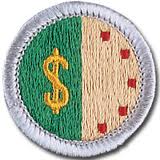 As youth groups go, Scouting is extremely cost-effective. Where else can Scouts experience fun and adventure for such a reasonable cost?
As youth groups go, Scouting is extremely cost-effective. Where else can Scouts experience fun and adventure for such a reasonable cost?
When I share the opportunity to become a Friend of Scouting, I often tell parents gathered at courts of honor and Blue & Gold Banquets that, dollar for dollar, Scouting is one of the least expensive youth programs available. Many parents understand this if they also pay the costs associated with other youth activities like travel sports. And the value is not just in the good times the Scouts enjoy, but the broad spectrum of activities – not to mention the values and aims of Scouting that we (hopefully) deliver.
But there is a cost, even though it isn’t that much, and someone needs to pay it.
Scouts (or, more conventionally, their parents) pay registration fees, purchase handbooks and uniforms, and pay for unit activities, either as they go or included in den or patrol dues or pack or troop fees.
The ninth point of the Scout Law is, of course
“A Scout is thrifty. A Scout learns to pay his own way and to help others.”
Most of the time, this involves some fund-raising on the part of the unit. We pretty much all sell, or have sold, popcorn as a joint unit/council fundraiser. Many units also do supplemental fund-raising to pay for ongoing program expenses or special projects like high adventure or equipment purchases. These can take many forms, such as product sales, work projects or sponsored discount cards. The principal constraints are that they must provide value to the purchaser, and that we cannot solicit donations.
When it comes to deciding just what fund-raising activities to pursue, the decision and execution usually falls to the committee. In a Cub Scout pack, this is entirely appropriate. In a troop, the committee is responsible for the finance, but why not involve the Scouts?
The Scouts are the ones who benefit most from Scouting, so shouldn’t they be the ones who are most involved in the process of paying for it? And not just hitting the streets hawking a product or doing the grunt work. Help them to define the goal and see what they come up with. There may be the usual fundraisers – selling Christmas trees, or doing cleanup work at a pro stadium – but maybe the Scouts have other ideas. It doesn’t hurt to bring them in on it. Encourage them to think outside what you’ve always done. They might not have the same perspective as the adults on the committee, but they also see things from their own viewpoint. The committee can provide guidance as to what is and isn’t appropriate.
This can be a challenge, of course – boys being boys, they’d rather let anyone else do the heavy lifting. They’re happy letting the committee and the parents decide and carry out fund-raising. The Scoutmaster and senior patrol leader can discuss ways to involve the Scouts in a discussion about ways to pay for the adventures that involve them.
If Scouts see the value of Scouting by not only working to raise the money but with a hand in the decision-making process itself, they will be more personally invested in the benefits and the outcome.
This post first appeared on Bobwhite Blather.



